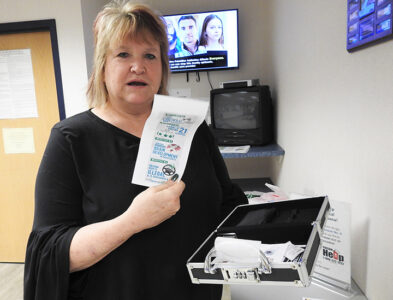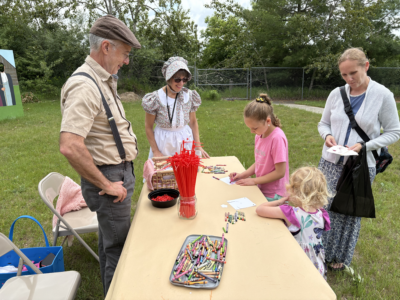Cannabis health risks, benefits call for informed residents

News Photo by Julie Riddle Cathy Goike, health education specialist for District Health Department No. 4, earlier this month displays a lockbox distributed by the Health Department to help residents secure marijuana and other drugs.
ALPENA — Twelve delicate plants growing behind Shane Skiera’s house mean he can move his hands, stand without pain, and put in a hard day’s work.
Like many others in Northeast Michigan, the Lachine man says marijuana makes his life better.
With legalization of marijuana in Michigan and medical provisioning centers and retail stores now selling cannabis products in the Alpena area, residents have ready access to a drug some say strengthens bodies and minds.
Others worry the drug’s presence in the community endangers residents’ health.
People who sell the drug — and some of those who use it — say it does more good than harm, offering pain relief and an escape from anxiety or other mental struggles and a legal way to unwind comparable to a beer at the end of a hard day.

News Photo by Julie Riddle Bags of gummy bears and cereal treats laced with cannabis tincture appear in the home of Lachine resident Shane Skiera earlier this month.
But health concerns — such as those causing a local increase in addiction and marijuana-related hospitalization — put adults and especially young people at risk, some say.
Lara Coughlin, assistant professor with the Addiction Center in the Department of Psychiatry at the University of Michigan, said safe use of the drug starts with knowing its risks.
“It’s not heroin,” she said. “It’s not fentanyl. But that doesn’t mean it’s harmless.”
RESPONSIBLE RELIEF
After legalization, Skiera moved from growing cannabis plants in the woods — the only cure he could find for debilitating pain and migraines that could last up to 30 days — to cultivating legal plants in a fenced enclosure behind his rural home.

News Photo by Julie Riddle Cannabis leaves on a plant grown for medical purposes by Lachine resident Shane Skiera appear at Skiera’s home earlier this month.
At one time a marijuana caregiver, licensed to help others manage their own pain with cannabis, Skiera now makes products for himself and his parents, all of whom have medical marijuana cards.
Without the drug, his serious health problems would almost certainly sideline him, he said, but he can still work, thanks to products and plants he tailors to keep his pain under control.
With a tidal wave of Michigan growers producing ever-new varieties of marijuana, stores serving hundreds of customers might not be able to get the right product into each person’s hands, he worries.
“I start thinking about all those people out there with cancers and stuff that are going for relief,” Skiera said, “but they end up smoking something that might actually make it worse.”
Responsible store owners and workers make sure customers know what each product will do and how to use it, said Joseph Puravs, budtender at Meds Cafe near Rogers City.

News Photo by Julie Riddle Framed by the leaves of a cannabis plant after harvest, Lachine resident Shane Skiera earlier this month describes his use of the plant to create products to combat pain.
The upwards of 150 customers who shop at the store on a busy day represent all ages and levels of experience with the drug. Most of the store’s first-time customers have a “healthy trepidation” about using the drug, Puravs said.
Budtenders explain cannabis products and dosages in layman’s terms, often suggesting low-dosage options for inexperienced users.
Store workers may caution customers away from a quick jump to whatever product offers the highest concentration, lest that product prove too strong, “and, the next thing you know, they’re in way over their head,” Puravs said.
Then again, he believes, marijuana carries fewer harmful side effects than other drugs, and most people will have few negative side effects if they use the wrong product.
“All that means is you eat too many snacks and go to sleep,” he said.

News Photo by Julie Riddle Lachine resident Shane Skiera examines a trimmed cannabis plant at his home earlier this month.
Teenagers — excluding the handful of minors who hold a medical marijuana card — rarely try to sneak into the store, possibly because, in a small town, budtenders will know who they are and send them packing, Puravs said.
Some customers come exclusively for sleep aids. Some want a quick high or a slow mellow just for fun, while others use marijuana instead of prescription drugs to fight pain, anxiety, or other ailments.
Check out the video below. Viewing on mobile? Turn your device horizontally for the best viewing experience. Story continues below the video.
FEELING GOOD
Healing can also come from feeling good, said Kevin DeKeyser, owner of Green Pharm Ossineke.

News Photo by Julie Riddle A billboard sponsored by District Health Department No. 2, posted along U.S.-23 north of Harrisville in September, reminds drivers to drive sober.
When his store transitioned from medical-only to recreational sales this summer, business instantly tripled.
Partly, that reflects a declining number of people who want medical cards, DeKeyser said.
As of September, more than 1,200 Northeast Michigan residents held medical marijuana cards — down from 1,573 in 2020 — according to the Cannabis Regulatory Agency.
Statewide, most medical marijuana cardholders list chronic pain as their reason for needing the drug.
Customers pay more in taxes for recreational marijuana but have to pay to procure and renew a medical card, and some people don’t want that hassle, DeKeyser said.
Customers do want marijuana for its pain-fighting properties, but they also want it because it’s fun, the shop owner said.
He described a group that came to his store this summer asking for “something to smoke around the campfire so we can get the giggles.”
Winding down with marijuana at the end of a day has the same healing properties as relaxing with a beer or a glass of wine, DeKeyser said.
People still associating marijuana with illicit activity may look down on people who use it, “but, meanwhile, they might have six cups of coffee and two packs of cigarettes,” he said. “That’s not very healthy, either.”
HARM THEY DON’T SEE COMING
While some people can safely use marijuana and products containing THC — the primary psychoactive chemical in a cannabis plant — for fun or health benefits, others may encounter harm they don’t see coming, said Coughlin, of the University of Michigan Addiction Center.
Innumerable products in wide-ranging dosages, some in significantly higher concentrations than users could find in the 1980s and 1990s, spell potential danger for people returning to the drug after decades, expecting the marjuana of their past, Coughlin said.
Many users don’t know enough to protect themselves from the withdrawal symptoms, adverse effects, and addiction associated with long-term use of the drug, she said.
Over the last few years, MyMichigan Medical Center Alpena has seen increasingly more patients in its emergency department who are experiencing cannabinoid hyperemesis syndrome, according to Dr. Paul Bucchi, emergency medicine physician at the hospital. That condition causes severe, repeated vomiting in some long-term, regular users.
Statewide, the rate of inpatient hospitalizations involving cannabis-related disorders nearly doubled from 2010 to 2017, before Michigan’s 2018 legalization — from 206 per 100,000 residents to 407 per 100,000 residents — according to a study of the impact of recreational cannabis legalization in Michigan conducted by the University of Michigan Injury Prevention Center.
Young people ages 15 to 24 made up the largest proportion of people hospitalized for cannabis poisoning, the study showed.
Alpena has also experienced an uptick in people seeking marijuana addiction treatment, said Kathy Freel, clinical director at the Sunrise Centre, an Alpena addiction treatment facility.
For every one patient who came for marijuana treatment last year, 10 came this year, Freel estimated.
Marijuana use can trigger withdrawal symptoms such as jitters, anxiety, nausea, and sleep problems in some people, but, because they lack the drama of withdrawal from a stronger drug, those symptoms may escape notice while users reach for more of the drug to feel better — “the classic addiction cycle,” Coughlin said.
Potential harm to young people worries her the most, she said.
One in 10 young adults ages 18 to 25 say they use marijuana daily, the highest level of young adult use in more than 30 years, according to a national study by the University of Michigan’s Institute for Social Research, released in September.
Statistically most likely to use marijuana, based on the Injury Prevention Center study, young adults also struggle with the most mental illness, possibly making them less likely to get needed therapy and other help because of reliance on the drug, Coughlin said.
Teens, though not legal users, have more access to the drug through friends and family who can buy it legally. They also have easier options for hiding its use, even in public, by use of THC-containing gummies or other edibles without the telltale smell of marijuana smoke to give them away — and researchers don’t yet know the full impact of long-term use on the developing teen brain, Coughlin said.
Not everyone will encounter harmful effects of marijuana, and the drug is not necessarily bad, but communities need to teach their residents about its possible dangers, Coughlin said.
In the past three years, the Cannabis Regulatory Agency allotted tens of thousands of dollars to Northeast Michigan counties, earmarked for education and outreach programs relating to marijuana.
District Health Departments No. 2 and No. 4, which serve Northeast Michigan counties, used that money on the counties’ behalf to run a social media campaign focused on marijuana safety, to purchase lockboxes that help keep the drug out of the hands of children, and to erect billboards cautioning drivers against driving high.
Health officials don’t want to be the only ones trying to teach residents about marijuana safety.
“Oh, gosh, no,” Goike said. “The more the merrier. It’s a community issue, really.”
Check out the interactive graphic below.
- News Photo by Julie Riddle Cathy Goike, health education specialist for District Health Department No. 4, earlier this month displays a lockbox distributed by the Health Department to help residents secure marijuana and other drugs.
- News Photo by Julie Riddle Bags of gummy bears and cereal treats laced with cannabis tincture appear in the home of Lachine resident Shane Skiera earlier this month.
- News Photo by Julie Riddle Cannabis leaves on a plant grown for medical purposes by Lachine resident Shane Skiera appear at Skiera’s home earlier this month.
- News Photo by Julie Riddle Framed by the leaves of a cannabis plant after harvest, Lachine resident Shane Skiera earlier this month describes his use of the plant to create products to combat pain.
- News Photo by Julie Riddle Lachine resident Shane Skiera examines a trimmed cannabis plant at his home earlier this month.
- News Photo by Julie Riddle A billboard sponsored by District Health Department No. 2, posted along U.S.-23 north of Harrisville in September, reminds drivers to drive sober.
- News Photo by Julie Riddle With a jar of tincture on a counter in his kitchen, Lachine resident Shane Skiera earlier this month describes the health benefits he experiences by using the fluid containing extracts from cannabis plants.

News Photo by Julie Riddle With a jar of tincture on a counter in his kitchen, Lachine resident Shane Skiera earlier this month describes the health benefits he experiences by using the fluid containing extracts from cannabis plants.










